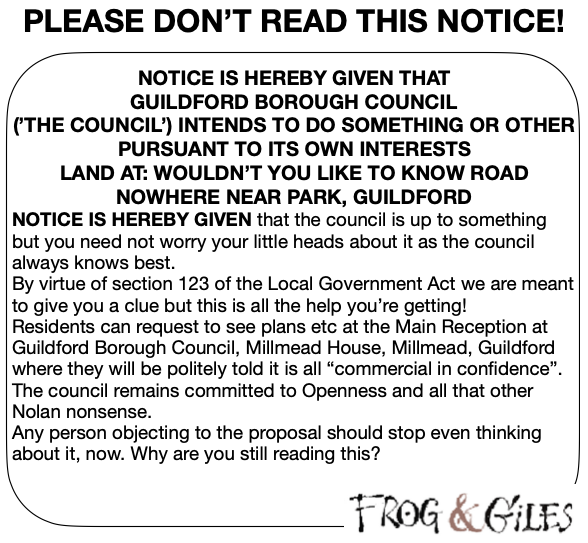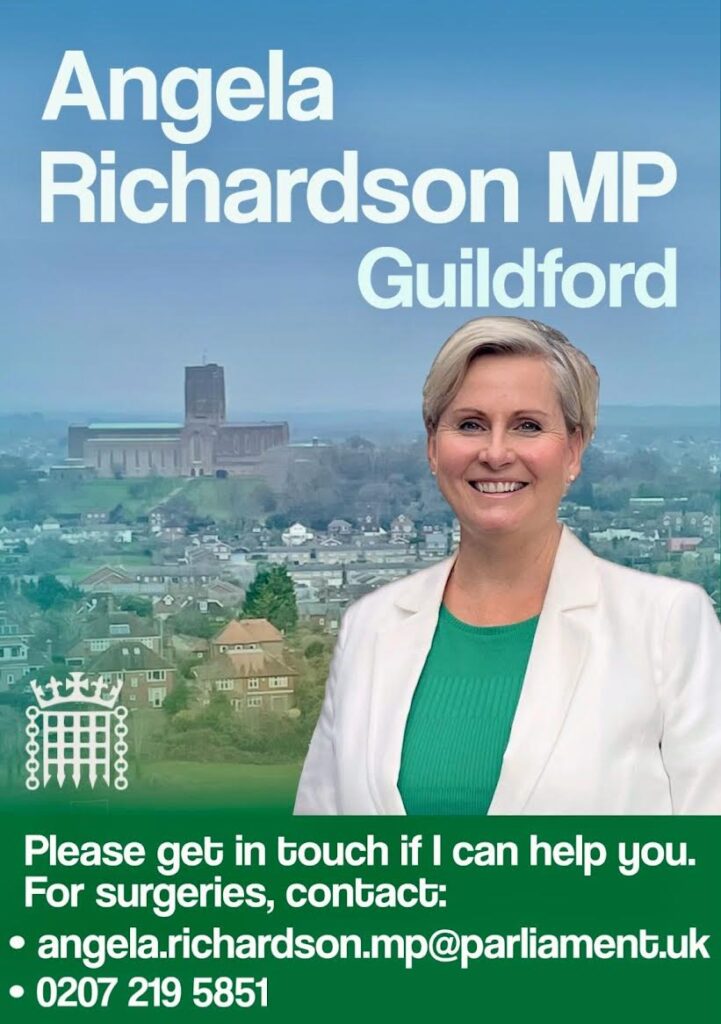 Abraham Lincoln
If given the truth, the people can be depended upon to meet any national crisis...
Abraham Lincoln
If given the truth, the people can be depended upon to meet any national crisis...
 Guildford news...
for Guildford people, brought to you by Guildford reporters - Guildford's own news service
Guildford news...
for Guildford people, brought to you by Guildford reporters - Guildford's own news service
Letter: Elected Mayor Referendum: Points Voters Should Consider
Published on: 27 Sep, 2016
Updated on: 27 Sep, 2016
From Guildford borough councillor Tony Rooth
When considering voting in the referendum on Thursday, October 13, for a directly elected mayor (DEM) in Guildford, I would suggest voters are aware of the following facts:
Holding the referendum will cost council taxpayers £130,000.
It took a total of five separate petitions calling for a referendum on DEM, amalgamated together, to be submitted before the petition was declared valid.
The required numbers for a valid petition are only 5% of the number of registered electors.
As an illustration of costs of having a DEM, Watford Borough pays its DEM £65,000 per year, almost three times our council leader’s allowance.
Watford is one of only three non-metropolitan district
In 2014-15, a task and finish group, cross party with independent representation, reviewed the council’s governance in detail, visited other councils, consulted various stakeholders and studied several methods of how Guildford could be run differently.
The group presented a detailed report dated April 7 2015 which concluded that a DEM would further concentrate powers in the hands of an individual.
 The group also recommended that all 48 elected councillors should feel involved in the process of running the council, draw on their talents and interests and increase engagement with stakeholders and the public.
The group also recommended that all 48 elected councillors should feel involved in the process of running the council, draw on their talents and interests and increase engagement with stakeholders and the public.
Therefore, the council agreed in 2015 to introduce politically balanced executive advisory boards to consider and make recommendations prior to formal consideration by the leader and Executive and give a wider remit to an overview and scrutiny committee whose chairman is preferably not from the majority political group.
Personally, I believe that these recent governance changes, made only last year, ensure greater involvement in policy and significant decisions by the 48 local councillors whom residents have elected to represent them. Such inclusivity in decision making would be difficult to reconcile with a DEM structure which has been introduced in only a few councils in England, generally much larger areas, populations and responsibilities than Guildford.
Therefore, I would urge registered voters in Guildford borough to vote for the council to continue to be run by a leader chosen by your 48 local councillors.
Tony Rooth is a former leader of Guildford Borough Council (Con, Pilgrims) and was the initial chairman of the task and finish group (as mentioned above), succeeded by Cllr Caroline Reeves (Lib Dem, Friary & St Nicolas), when he returned to the Executive.
Responses to Letter: Elected Mayor Referendum: Points Voters Should Consider
Leave a Comment Cancel replyPlease see our comments policy. All comments are moderated and may take time to appear.

See Dragon story: GBC’s Explanation of Major Land Sale Notice Error ‘Borders on Arrogant’ Says Councillor



Recent Articles
- Birdwatcher’s Diary No.304
- Cyclist Dies in Peaslake
- Surviving Strategic Director Quits to Take Up CEO Role with a West Sussex Council
- Letter: Damning Reports Should Not Be Used to Gain Political Advantage
- New Leader of the Opposition at Waverley
- Surrey Day’s Celebrations Took to the Skies
- Notice: Dance with Junction 9 to Raise Money for Charities
- Mistreated Former Sub-postmasters Receive Standing Ovation
- Man Arrested for Attempted Rape in West Horsley
- Letter: Cross-party Effort Required to Improve Police Resourcing in Surrey


Recent Comments
- Olly Azad on Mistreated Former Sub-postmasters Receive Standing Ovation
- Barry Jutsum on Letters, Comments, Complaints Policy and Privacy Statement
- Aubrey Leahy on Guildford Police Station to Close – Officers to Move to Mount Browne HQ
- John Ferns on Guildford Police Station to Close – Officers to Move to Mount Browne HQ
- Barry C Williams on Letter: Cross-party Effort Required to Improve Police Resourcing in Surrey
- Anthony Mallard on Guildford Police Station to Close – Officers to Move to Mount Browne HQ
Search in Site
Media Gallery
Dragon Interview: Local Artist Leaves Her Mark At One of England’s Most Historic Buildings
January 21, 2023 / No Comment / Read MoreDragon Interview: Lib Dem Planning Chair: ‘Current Policy Doesn’t Work for Local People’
January 19, 2023 / No Comment / Read MoreA3 Tunnel in Guildford ‘Necessary’ for New Homes, Says Guildford’s MP
January 10, 2023 / No Comment / Read More‘Madness’ for London Road Scheme to Go Ahead Against ‘Huge Opposition’, Says SCC Leader
January 6, 2023 / No Comment / Read MoreCouncillor’s Son Starts Campaign for More Consultation on North Street Plan
December 30, 2022 / No Comment / Read MoreCounty Council Climbs Down Over London Road Works – Further ‘Engagement’ Period Announced
December 14, 2022 / No Comment / Read MoreDragon Interview: GBC Reaction to the Government’s Expected Decision to Relax Housing Targets
December 7, 2022 / No Comment / Read MoreHow Can Our Town Centre Businesses Recover? Watch the Shop Front Debate
May 18, 2020 / No Comment / Read More







Stuart Barnes
September 28, 2016 at 9:29 am
The idea an elected mayor is daft, costly, and a waste of our time. It has been put forward only by a few interested parties. We should all vote against.
Jim Allen
September 28, 2016 at 2:01 pm
While the current system has some serious flaws at least after four years we can replace them.
The elected mayor system could not be replaced for 10 years, albeit that he/she has to face election every four years.
Just a little bit more honesty and openness wold go a long way to improve the current process.
Jules Cranwell
September 28, 2016 at 7:42 pm
It would help this debate to hear more of the truth, rather than the usual Tory spin.
The leader is not chosen by 48 councillors. It is chosen by a small cabal of Tory councillors, who tell the rest of their flock how to vote. How else could we have ended up with such mediocrity at the top?
Councillors from the other parties, some with immense talent, are sidelined, ignored, sneered at, insulted, and openly mocked at council debates.
Members of the public are likewise ignored and insulted, to the extent of being considered a “bloody rabble” by the Tory elite.
The recommendations of the Task and Finish Group have been largely ignored as has the scrutiny committee, and the standards committee has not met in years.
However, having said all that, the mayoral system would be an even worse dictatorship, so we are left with the choice of voting for the lesser of 2 evils.
At least under the status quo, we have the chance to change the makeup of the council in 3 years, whereas, we could not revert form the mayoral system for 12 years.
Then there is the character of those involved to consider. Do we really want a return to the Mansbridge/Juneja trajectory?
Somewhat reluctantly, I’ll be voting to retain the status quo, and continue to campaign to improve it, and make it accountable.
Peta Malthouse
October 11, 2016 at 1:48 pm
The strength of the mayoral system lies in the ability of the individuals it attracts to the office of mayor.
Whereas it may suit cities the size of London, Manchester and elsewhere to recruit a multi-abled and experienced politician, often an MP or former MP Guildford is too small fry.
Our first police commissioner caused conflict and with no one to check him simply remained in post at huge cost to us with few discernable benefits – not even his fellow Tories liked him.
So when you vote remember that to vote for a mayor and change in our present system you are voting essentially to waste money by chucking it at a system which will not improve what we have. And more likely be less beneficial to the ordinary voter.
Maurice Barham
October 12, 2016 at 10:45 am
It’s a pity that a consensus appears to be developing based on the perceived intentions of the promoters rather than on an objective analysis of the facts.
How many have seen the glossy A5 leaflet published in early September by GBC’s counting officer which clearly sets out the similarities and differences between the two forms of governance? [Perhaps the Editor could provide us with a copy of the centre pages]. We assume that it should have reached every household in the borough but then, perhaps, some got lost on the way.
And now we have our esteemed Rt Hon MP issuing a circular only yesterday which states: “The one person, the directly elected Mayor, would replace the current 10-member Executive Committee.”
Actually, the DEM would choose his own cabinet, just like the Leader of the council, only in this case to include at least two councillors, but he could engage individuals possessing the special expertise required for each of the portfolios.
Might it not be better to have a dedicated in-house cabinet of experts, each at some £35K p.a. than a raft of consultants, whose interests may not be directly aligned with those of the council, to provide the special advice at £100K a throw?
The 48 councillors would still be required to participate in the regulatory committees: planning, licensing, overview & scrutiny, etc. as at present, and the DEM’s budget would still have to be approved by full council.
The leaflet makes no mention of a “political Mayor”. Andy Street, boss of John Lewis, has just been nominated as the Tories’ candidate for the inaugural West Midlands mayoral election. Would that make him political?
Valerie Thompson
October 12, 2016 at 2:17 pm
Please consider who it is that has proposed this crazy idea of having an elected mayor: a convicted criminal, a nightclub owner and a drink-driver.They have taken the dubious step of paying students to collect signatures to force this unecessary referendum.
Please vote against any change to the present system.
As expressed by Jules Cranwell,the way the council is run at the moment is not ideal and some of the present councillors seem not to be working for the people who elected them, but have their own mysterious agendas. In spite of this it would be madness to impose a dictator.